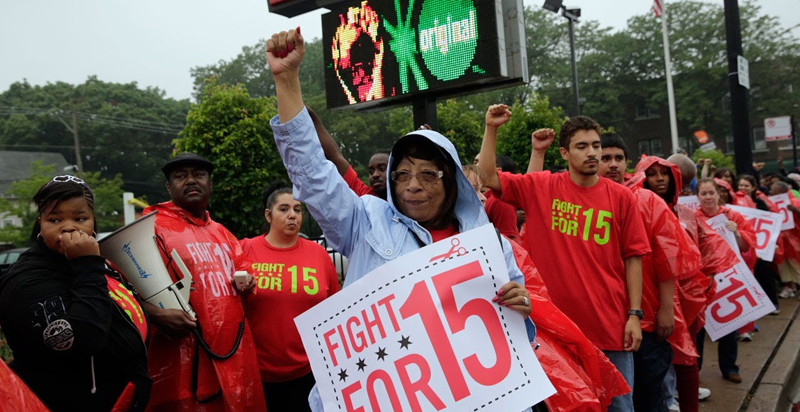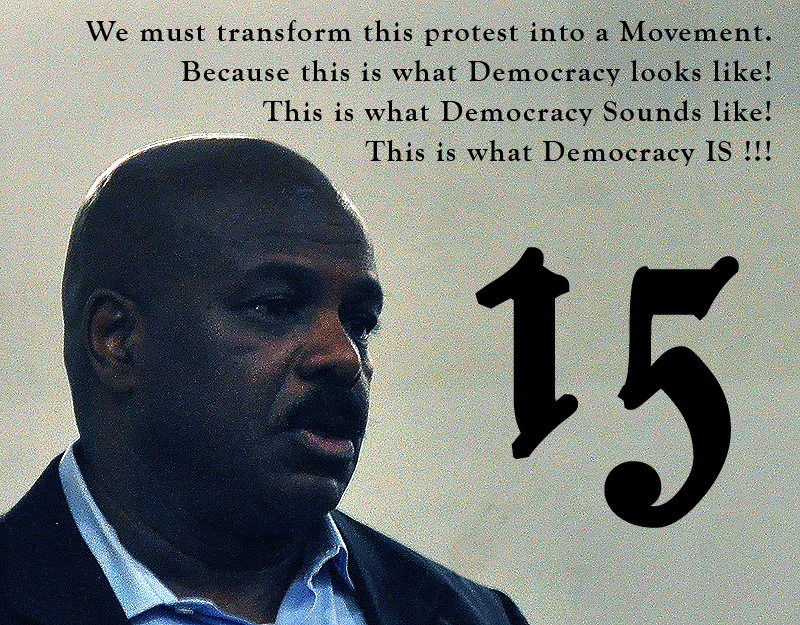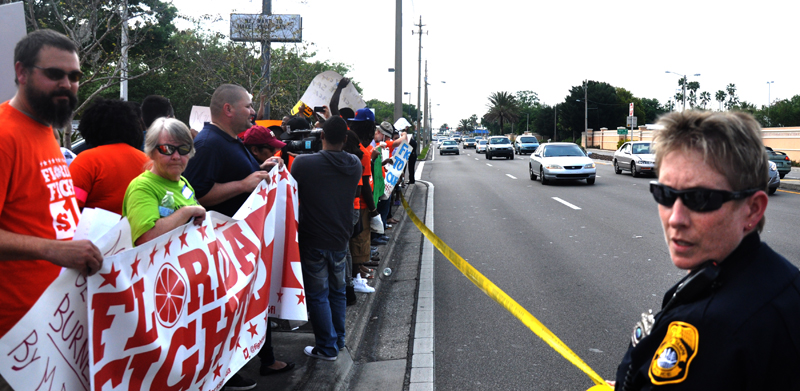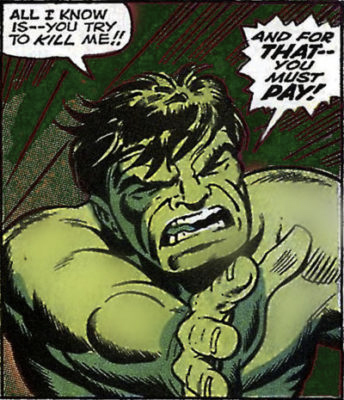“Why have the graduate assistants joined in, why are fast food workers together, why are home care workers together, why are all these public sectors workers together? Because as Dr. King said, injustice anywhere is a threat to justice everywhere. Justice is indivisible … You who are gathered here today are the foot soldiers in a new movement. … I believe more than ever before that the time is right for a sustained period of unrest, and a long period of agitation. America needs a wakeup call. You have the power, you have the strength, we have the cause.”
— Rev. Charles McKinzie
USF Tampa campus
March 18, 2015
A powerful gathering it was — Homecare Workers, Fast Food Workers from as far away as Texas, Our Walmart workers, Graduate Assistants United, and Adjunct Professors, all now part of the growing Fight for 15. The event marked the growth of what had started out as a walkout by fast food workers in New York, and transformed into a burgeoning movement, pulling together more and more sectors of low-wage workers into a force demanding a minimum wage of $15/hour. Their leadership has provided the spark for a nationwide movement.
 The coming out of the Grads and Adjuncts now bears particular importance, not just their numbers but what they represent. They are not the “traditional poor.” They are shining examples of pursuit of the American Dream. In campaigning for 15 on the streets, organizers are met over and over with a sneering “You people should make something of yourselves, go get an education!” Who is following this so-called advice better than our teachers? And their reward is poverty and insecurity and disrespect.
The coming out of the Grads and Adjuncts now bears particular importance, not just their numbers but what they represent. They are not the “traditional poor.” They are shining examples of pursuit of the American Dream. In campaigning for 15 on the streets, organizers are met over and over with a sneering “You people should make something of yourselves, go get an education!” Who is following this so-called advice better than our teachers? And their reward is poverty and insecurity and disrespect.
If this is their lot, who among the rest of the American middle class can feel safe?
It started in the streets …
One could arbitrarily say the event had begun at 3:00 that afternoon, when some 90 fast food workers and their supporters had marched from a Taco Bell on Tampa’s Busch Blvd. down to a McDonald’s a few blocks away. The immediate focus was on the chain’s brutal health and safety conditions. A Hart Research Associates report states that 79% of fast food workers have suffered burns in the past year (burn victims are told to smear on some mustard and keep working), 67% have been cut, 34% hurt from heavy lifting and 23% injured in falls on wet or oily floors.
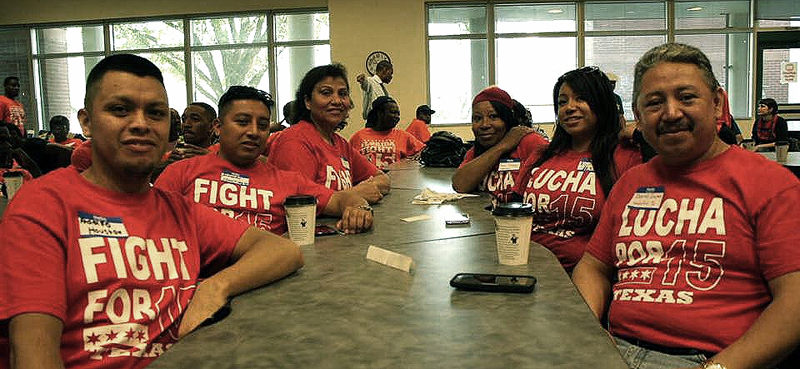 While police in nearby Temple Terrace have tried to keep things cool during past actions, this was much more tense, the police more aggressive and intimidating, using “crime scene” tape to restrict the movements of the marchers, who responded by briefly surging into the parking lot, making clear that they were not about to back down.
While police in nearby Temple Terrace have tried to keep things cool during past actions, this was much more tense, the police more aggressive and intimidating, using “crime scene” tape to restrict the movements of the marchers, who responded by briefly surging into the parking lot, making clear that they were not about to back down.
… and moved into the halls
That spirit was carried a few hours later into the USF-Tampa ISA Building, where Adjunct Professor Cole Bellamy, who MC’ed the event, talked of how “In higher education, we have this idea that’s it’s a bunch of people wearing stuffy tweed jackets who walk around going harumph harumph harumph. But the reality is that most of the academic labor in this country is being done by adjunct, contingent labor. [A report by the professors’ association said adjuncts make up 76 percent of U.S. faculty.] This labor is guaranteed a one-year contract at best. Tonight we have people who are everywhere, every day, taking care of loved ones, people who are teaching your classes, people who are in the most intimate parts of your lives. They are not making enough to get by.”
Speaker after speaker told their own stories and the stories of their co-workers.
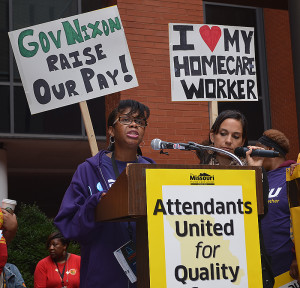 Pat Walker (Homecare Worker):
Pat Walker (Homecare Worker):
You try to make them feel good, you’ve got to make them happy. You can’t just go in like “I really don’t want to do it today, because I’m not making a lot of money.” You can’t just do that. So that’s why I’m fighting for 15. And there are a lot of people out there worse off than me, they’ve got 3 or 4 kids, and they’re just not making enough money. That’s why I’m fighting for 15.
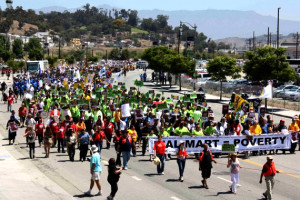 Sonia Wheeler (Our Walmart):
Sonia Wheeler (Our Walmart):
I’ve been a Walmart worker for 30 years, and I’m 55 years old. The pressure comes from the people that are there [customers], and we struggle. You may think that as a customer you’re not important, but you’re very important to us, because that’s how we pay our bills. To do this, we all need to reach out to one another. We have to work as a team. Walmart is smelling their money more than their people, that’s us. But the bottom line is that we will not bow down.
June Brown (Graduate Student):
I live with another graduate student, and between us we make about $17,500 per year. We each pay about $800 per semester in fees, that’s not optional. If we don’t pay that, we don’t work. So we make more like $14,500 per year for two people. When I moved to Florida, I was told the cost of living was lower. But I couldn’t afford to pay the repair bills on my car. Or pay for books, or traveling to the conferences we have to attend. That doesn’t include healthcare. If it weren’t for government assistance, we couldn’t survive. I’ve worked all through my graduate education to get a degree. It’s supposed to be better. It’s not better. Definitely not better. In some ways it’s even worse. At least when I worked in fast food, I got free meals, and when my shift was over, it was over, but now I have to be on call at any hour of the night for my students and I really care about them.
The university doesn’t ever have to renew our contracts. If they don’t, they don’t even call it “firing.” There’s no recourse. Now I’ve been having medical problems. If we get too sick, not only do we lose our paychecks, we have to pay back our tuition. And for out-of-state students, that’s a lot of money. So every single grad student is one step away from financial ruin. It’s a myth that if you get an education you can become financially secure. But for all this, it still doesn’t affect who I am as a person, it doesn’t affect my work ethic, it doesn’t affect my moral commitment, it doesn’t affect the way I treat my family and friends, it doesn’t affect my soul. Despite the fact that the system exploits whoever it can, however it can, to turn us against each other. That’s what we are fighting for.
Megan (head of Graduate Assistants United):
I think a lot of you don’t realize that the academic sector is not exempt from the same problems you are all facing. We are in the same precarious position as every U.S. worker. A huge problem is under-staffing. This creates horrible tensions on the job, creates all kinds of problems. So the fight for a living wage is just the beginning. The people who run this have been stealing from the public system, taking money out of the public’s pockets. Suppressing our wages, understaffing our institutions and the services that go to every citizen in the state of Florida. If you drive on the street, if you even drink a glass of water, you are depending on public employees. So we’re all in this struggle together.
Rev. Charles McKenzie (Florida Coordinator of Rainbow/PUSH):
I believe now more than ever before that this is a watershed moment in our history. This issue goes beyond color, it goes beyond gender, it goes beyond the “isms.” Because ultimately it is a question of survival — here in the richest nation in the world, where we are receiving starvation wages. This is a nation that boasts of five fundamental driving principles, equal protection under the law, equal access, equal opportunity, fair share, and compassion for the least of us. This is the nation that says “bring me your poor huddled masses that yearn to breathe free.”
Those of us who participate in these protest activities must come to see that as the rich get richer and the poor get poorer, and we become more and more like a banana republic, we must transform this moment and this protest into a movement, because THIS IS WHAT DEMOCRACY LOOKS LIKE, THIS IS WHAT DEMOCRACY SOUNDS LIKE. THIS IS WHAT DEMOCRACY IS! You have decided to leave your comfort zones, to put your bodies on the line, in order to transform this nation, this state, this community. You’ve decided to endure some short-term pain in order to achieve the long-term gain. And the sooner we realize that we are tied together in a single garment of destiny, the better off we will be.
You who are gathered here today are the foot soldiers in a movement. I believe more than ever before that the time is right for a sustained period of unrest, and a long period of agitation. America needs a wakeup call. You have the power, you have the strength, we have the cause. So we will take it from this place into the streets, onto the television sets, into the radio stations, into the newspapers and into the magazines, to let the politicians know, let the corporations know, that in spite of where you are, in spite of what you do, that the power of the people is still greater than the people in power. We will make a better America. We will take courage, as we’re marching, as we’re demonstrating, as we are organizing ourselves. Now our question to the rest of the left will be, why have you not joined us? Because the pain is spreading. If you don’t work with us, you work against your own common welfare. We are soldiers in a new movement, in a new era, this youthful explosion of power. I marched in St. Petersburg and saw young people marching through the streets, saying Black lives matter, saying no justice, no peace, saying we want a living wage. You young people here have the potential to transform America. It is your time, it is your call, it is your charge to change America again.
McKenzie and the crowd came together in one powerful voice:
15 and a Union! Now henceforth and forever forward, without any trepidation or reservation! It is 15 and a Union because we need a living wage in this country! 15 and a Union! What do we want? [shouted by all, “15!”] When do we want it? [“Now!”] What do we want? [“15!”] When do we want it? [“Now!”] No justice? [“No peace!”] No justice? [“No peace!”] What do we want? [“15!”] When do we want it? [“Now!”] THIS IS WHAT DEMOCRACY LOOKS LIKE! [“THIS IS WHAT DEMOCRACY LOOKS LIKE!”] THIS IS WHAT DEMOCRACY SOUNDS LIKE! [“THIS IS WHAT DEMOCRACY SOUNDS LIKE!”] THIS IS WHAT DEMOCRACY IS! [“THIS IS WHAT DEMOCRACY IS!”]

